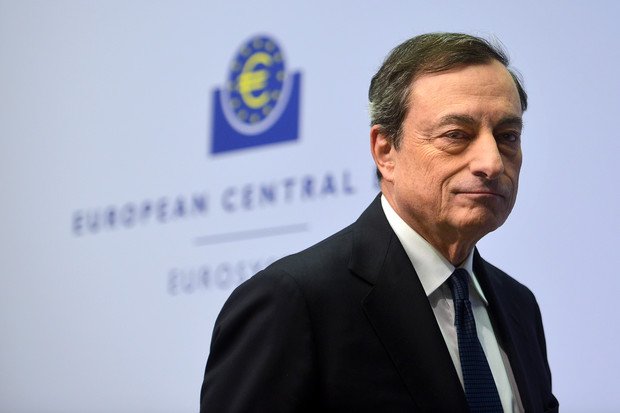The European Central Bank (ECB) has unveiled an €1.1 trillion ($1.3 trillion) plan to boost eurozone economy.
The ECB will buy bonds worth €60 billion ($72 billion) per month until the end of September 2016 and possibly longer, in what is known as quantitative easing (QE).
The bank has also said eurozone interest rates are being held at the record low of 0.05%, where they have been since September 2014.
ECB president Mario Draghi said the program would begin in March.
The eurozone is flagging and the ECB is seeking ways to stimulate spending.
Earlier this month, figures showed the eurozone was suffering deflation, creating the danger that growth would stall as businesses and consumers shut their wallets, as they waited for prices to fall.
Mario Draghi said the program would be conducted “until we see a sustained adjustment in the path of inflation”, which the ECB has pledged to maintain at close to 2%.
He told a news conference the ECB would be purchasing euro-denominated investment grade securities issued by euro-area governments and agencies and European institutions.
However, “some additional eligibility criteria” would be applied in the case of countries under an EU and International Monetary Fund (IMF) adjustment program.
The value of the euro fell following Mario Draghi’s announcement, falling by more than a cent against the US dollar to $1.1472.
Lowering the cost of borrowing should encourage banks to lend and eurozone businesses and consumers to spend more.
It is a strategy that appears to have worked in the US, which undertook a huge program of QE between 2008 and 2014.
The UK and Japan have also had sizeable bond-buying programs.
Mario Draghi said the ECB’s own program had been taken “to counter two unfavorable developments”.
“Inflation dynamics have continued to be weaker than expected,” he said, with most inflation indicators at or close to historical lows.
“Economic slack in the euro area remains sizeable and money and credit developments continue to be subdued,” he added.
At the same time, it was necessary to “address heightened risks of too prolonged a period of low inflation”.
Mario Draghi said there had been a “large majority” on the ECB’s governing council in favor of triggering the bond-buying program now – “so large that we did not need to take a vote”.
Up until now, the ECB has resisted QE, although Mario Draghi reassured markets in July 2012 by saying he would be prepared to do whatever it took to maintain financial stability in the eurozone, nicknamed his “big bazooka” speech.
Since then, the case for quantitative easing has been growing.
In advance of the ECB’s announcement, there had been speculation that the central bank would not actually buy any bonds itself, but would invite the central banks of eurozone member governments to do so.
In the event, Mario Draghi said only 20% of the new asset purchases would require national central banks to shoulder risks outside their own borders.
[youtube KKXs1cTNTfQ 650]
